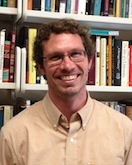
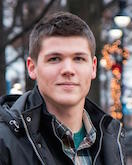 Kingdom Politics: In Search of a New Political Imagination for Today’s Church, a book supported by the Project on Lived Theology, will be published at the end of April. The book’s authors–U.Va. graduate student and Project alum Kristopher Norris and U.Va. alum Sam Speers–offer the following preview of the research and insights presented in the book:
Kingdom Politics: In Search of a New Political Imagination for Today’s Church, a book supported by the Project on Lived Theology, will be published at the end of April. The book’s authors–U.Va. graduate student and Project alum Kristopher Norris and U.Va. alum Sam Speers–offer the following preview of the research and insights presented in the book:
Just as the 2012 election season began picking up steam, we embarked on a journey to explore the ways churches engage and avoid politics in the midst of a fraught political climate. Equipped with the freedom of summer break, and a generous grant from the Project on Lived Theology, we set off for our first church visit, just a short drive from the wide sandy beaches of Southern California.
Five congregations, thirteen plane rides, two stolen iPhones, and nearly two years later, we concluded our research in the middle of a Polar Vortex in Atlanta, thankful to finally retreat indoors, sift through hours of interviews and pages of notes, and begin to answer our core questions: What does it mean for the church to be political? How should the church make decisions about when to engage or avoid politics? And what visions of politics are communicated by the actual practices of congregations—their lived theologies?
A popular book by two political scientists recently declared that “there is little politics in church.”[1] We came to believe that this claim profoundly obscures the deeply and inherently political character of the church—which is, at its core, a community defined by its allegiance to a new King and its citizenship in a new Kingdom. The church is an inescapably political body, called to embody a new and different form of politics to the world. However, American culture teaches us to think of politics fundamentally in terms of partisanship. In the absence of compelling alternative models for faithful Christian political engagement, churches often fall into one of two traps—avoiding politics entirely, or pledging allegiance to a particular issue or party.
Both responses reflect a poor understanding of the church’s political identity. The church needs a new political vision, one that takes its cues about the nature of politics not from the state, but from another political reality: the Kingdom of God. And during our visits to churches around the country, we caught glimpses of ordinary practices that have the potential to help the church build just such a vision.
Take Ebenezer Baptist in Atlanta, which has established partnerships with Catholic Charities USA, local government, and secular nonprofits to serve its inner-city neighbors. Or First & Franklin Presbyterian in Baltimore, whose congregation reads aloud the names of people killed in combat in Iraq and Afghanistan—from both sides of the conflict. Or Saddleback Church in California, whose medical missionaries are so effective that they were asked to testify before Congress about global healthcare strategy. These actions may not seem political in the way we have been taught to understand that word—but, as we claim in the book, each demonstrates a way the church can allow its allegiance to Christ’s mission to break down dividing walls and offer a vision of the Kingdom to their congregation, their neighbors, and the world.
These ordinary practices (and many others like them) show that the church’s response to an overly partisan public arena need not be to join a camp, nor to abandon politics altogether, but to orient its allegiance toward the only political reality that transcends parties and nations, tribes and tongues, cultures and generations. The church must learn to understand politics not fundamentally as divisive, but as a framework that unites believers in allegiance to a common King and Kingdom. And maybe—just maybe—a church that takes this posture could find greater unity with people who do not share its ultimate allegiance, by identifying and pursuing common loves with and for them.
Our book, Kingdom Politics: In Search of a New Political Imagination for Today’s Church (Cascade Books, 2015), traces our visits to these five congregations and offers snapshots of the ways their ordinary practices of worship, leadership, and missions can shape and reshape the church’s political imagination. The stories in this book demonstrate that churches are inherently political in the deepest and most basic sense, and offer glimpses of the kind of political imagination we need in churches—not conservative politics, liberal politics, or anti-politics, but Kingdom politics.
[1] Robert Putnam and David Campbell, American Grace: How Religion Divides and Unites Us (New York: Simon & Schuster, 2012), 442.
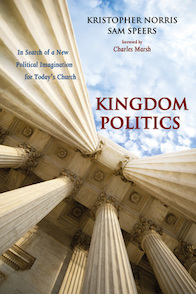

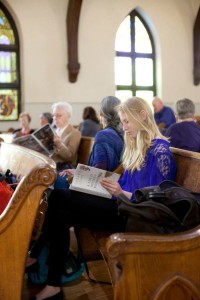 On Saturday, May 2 at 2 p.m., Charles Marsh will give a book talk and reading of Strange Glory at First Presbyterian Church Chapel in Staunton, Virginia. The church is
On Saturday, May 2 at 2 p.m., Charles Marsh will give a book talk and reading of Strange Glory at First Presbyterian Church Chapel in Staunton, Virginia. The church is 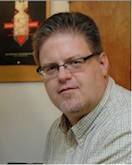 On Saturday, April 25, at 10 a.m., the Project on Lived Theology will host a workshop entitled, “Parables of Privilege Meeting Poverty: a conversation on the posture of social service workers.” Participants will discuss privilege, poverty, and faith-based service with Josh Kaufman-Horner, co-founder of Mission Year. Josh will talk about how to navigate difference and avoid some of the pitfalls of various kinds of privilege.
On Saturday, April 25, at 10 a.m., the Project on Lived Theology will host a workshop entitled, “Parables of Privilege Meeting Poverty: a conversation on the posture of social service workers.” Participants will discuss privilege, poverty, and faith-based service with Josh Kaufman-Horner, co-founder of Mission Year. Josh will talk about how to navigate difference and avoid some of the pitfalls of various kinds of privilege.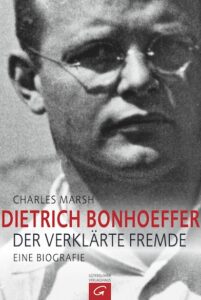
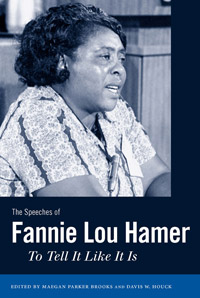 Maegan Parker Brooks and Davis W. Houck have compiled a volume of twenty-one of Fannie Lou Hamer’s most important speeches spanning her civil rights career, entitled The Speeches of Fannie Lou Hamer: To Tell It Like It Is. Published by University Press of Mississippi, this is the first collection of her speeches ever published.
Maegan Parker Brooks and Davis W. Houck have compiled a volume of twenty-one of Fannie Lou Hamer’s most important speeches spanning her civil rights career, entitled The Speeches of Fannie Lou Hamer: To Tell It Like It Is. Published by University Press of Mississippi, this is the first collection of her speeches ever published.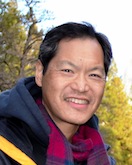
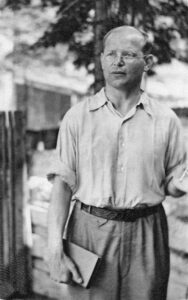

 Kingdom Politics: In Search of a New Political Imagination for Today’s Church, a book supported by the Project on Lived Theology, will be published at the end of April. The book’s authors–U.Va. graduate student and Project alum Kristopher Norris and U.Va. alum Sam Speers–offer the following preview of the research and insights presented in the book:
Kingdom Politics: In Search of a New Political Imagination for Today’s Church, a book supported by the Project on Lived Theology, will be published at the end of April. The book’s authors–U.Va. graduate student and Project alum Kristopher Norris and U.Va. alum Sam Speers–offer the following preview of the research and insights presented in the book: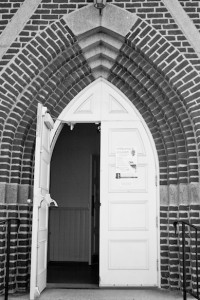
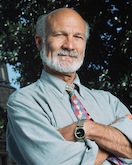 erwas, Gilbert T. Rowe Professor Emeritus of Divinity and Law at Duke University, will join us in the Department of Religious Studies at U.Va. on Monday, March 16th, for a luncheon seminar entitled:
erwas, Gilbert T. Rowe Professor Emeritus of Divinity and Law at Duke University, will join us in the Department of Religious Studies at U.Va. on Monday, March 16th, for a luncheon seminar entitled: